| کد مقاله | کد نشریه | سال انتشار | مقاله انگلیسی | نسخه تمام متن |
|---|---|---|---|---|
| 1046919 | 1484409 | 2014 | 15 صفحه PDF | دانلود رایگان |
• The paper studies the drivers of slum dwellers' demand for improved electricity.
• The demand for improved electricity is explained by multiple factors.
• Affordability (including a higher monthly consumption fee) prevents regularization.
• Other factors are informality, lack of required paperwork or house ownership.
• Complex slum governance and distrust from the communities should also be addressed.
Based on a survey of 3000 households, covering both authorized and informal connections to electricity, the paper examines the key drivers of the demand for regulated electricity service in 4 slums of Mumbai. The methodology builds on the typical slum context, where informal connections are easily obtained and widespread. WTP for safe, authorized electricity provision is estimated through both “stated” preferences and “revealed” ones extrapolated from present electricity demand. WTP estimates are further validated using propensity score matching. The comparative analysis confirms that affordability (of both the initial investment and the increased consumption fees) is a primary barrier to regularization. Additionally, lack of house ownership status or address proof, precarious house construction and, possibly, pressure from local leaders all play an important role in choosing an electricity supplier. Policies to reduce the prevalence of informal connections should also address contextual issues like the intricacy of Mumbai's governance and social exclusion.
Journal: Energy for Sustainable Development - Volume 21, August 2014, Pages 66–80
